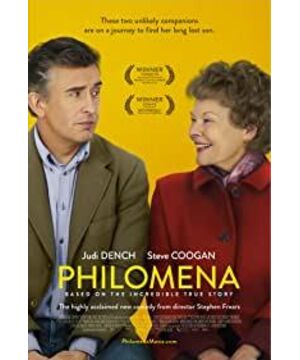This year’s Oscar season’s movies have been watched seven or eighty-eight. Needless to say, I prefer "Her", and the other is "Filo Mena". To be precise, it is the heroine starring Judy Dench in "Blue Jasmine". The difference between Cate Blanchett and her is the difference in life experience. It’s not good to say professional things. In terms of light and shadow effects, most of the British skit films give me a sense of TV movies with a cold picture and insufficient photography, but the delicate and calm performances of the actors can always restore them to Shakespearean plays. The classic level.
The movie "Filo Mena" is adapted from the documentary work "Fino Mena's Lost Child" by BBC reporter Martin Skessmith. It is much clearer for ordinary viewers. The story is about an old lady named Philomena who became unmarried and conceived when she was young. She was punished and imprisoned in a monastery. Fifty years later, she told the frustrated former BBC reporter Martin about this secret, and with Martin's company, she began her journey of finding a child.
For European and American films, challenging or mocking politics is not a big deal. Only religious subjects are absolutely sensitive and difficult to control. In recent years, the restraint of religion on the secular society has become weaker and weaker, and the constant exposure of child molestation scandals has deepened people's denial and suspicion of the church system. Like "Bad Education" and other films, "Filo Mena" is merciless in exposing the conservative, decayed and cruel monastery. The old nuns in the film are like the gloomy monastery behind them, with corrupt corpses. gas. But the outstanding thing about Philomena is that it is more than accusation and flogging. It borrows Philomena herself to convey the generosity and kindness of faith itself.
The main storyline of the film is Martin and Philomena’s child-finding journey. When the truth is revealed, I think most of the audience is stubborn about why Philomena did not choose Martin's anger and resistance, and just said lightly. "I forgive you." In fact, all of this has been given in the previous dialogue between Martin and Filomena in the car, and the answer has been given: Filomena euphemistically stated that Martin’s condition for helping her was originally "chasing news effects", and the media advocated fairness and justice. , The starting point is the maximization of the eyeball economy. What are the moral advantages and disadvantages of "consumer privacy" and "deprivation of maternal love"? What is the essential difference between adjudicating nuns with justice and justice, and nuns punishing teenage mothers in the name of God?
When you stare into the abyss, you will be swallowed by the abyss, and when you beat the tiger, you will become a more ferocious beast than the tiger. The pleasure of revenge dissipated at the moment the revenge succeeded, and the meaning of revenge also vanished at the same time.
For such a difficult subject, real events provide an emotional basis, the script strengthens the character's character, and Judy Dench’s performance is full of emotions and layers. She asked Martin to recall the meeting with her son, which is really a textbook-level performance. The most moving part of the film is when Philomena abandons the warning in the warning room and walks out of the church. She did not give up her faith. Her devotion to God and the maintenance of goodness have not changed. Instead, she no longer judges herself under the pretense of others, and no longer relies on the "rules" of the church to restrain herself. Filomena is constantly in the process of self-examination. In, constantly revising the assessment of herself, she even dared to open up her heart to recall the beauty, breaking the spiritual shackles that had tortured her all her life.
"I forgive you".
This was the moment when Philomena and the most shining part of her faith were extremely close, and it made people excited.
The reason for this feeling is more or less because I was reading a book-"The Religion of Man" recently. In almost all religions, institutions and religious organizations are normative behaviors, and epiphany and detachment depend on the self-examination of believers. Religion and religious organization themselves are two concepts, but we often confuse content and form. For example, when we talk about equality, it is equivalent to "the minority obeys the majority", but the "minority obeys the majority" is true equality to those of the "minority"? In fact, people rarely disagree with the content, and the differences are mostly in the form. In order to eliminate the differences, people began to judge and judge each other, relying on not truth, but power. People can be conquered, but where will they be changed by external forces?
Although I am an atheist, I believe that the active mission of a person in life is to pursue a more perfect personality. The process of pursuing personality realization will never rely on the judgment of others-no one can judge you, except yourself. Regardless of the value system in which heterogeneous people are reduced to slaves, self-inspectors are confused and entangled, but they distinguish us from the tiger and the abyss.
WeChat public account: mydunhe
View more about Philomena reviews











